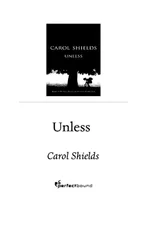“What exactly do you do?” they only once asked. He worked as a correspondent for a newspaper, he explained. (He did not use the word journalist.) And he hoped one day to write a book. (“Ah! A book! Splendid!”)
The wedding was in the month of June and was held in the garden. Meershank’s relatives did not trouble to travel all the way up from Chicago. The wedding breakfast was served out-of-doors, and the health of the young couple—Meershank at twenty-seven was already starting to bald—was toasted with a non-alcoholic fruit punch. The family was abstemious; the tradition went back several generations; alcohol, tobacco, caffeine—there wasn’t a trace of these poisons in the bloodstream of Meershank’s virgin bride. He looked at her smooth, pale arms—and eventually, when legally married, at her smooth, pale breasts—and felt he’d been singularly, and comically, blessed.
There is a character, Virgie Allgood, in Meershank’s book Sailing to Saskatchewan , who might be said to resemble Louise. In the book, Virgie is an eater of whole grains and leafy vegetables. Martyrlike, she eschews french fries, doughnuts and liver dumplings, yet her body is host to disease after disease. Fortified milk fails. Pure air fails. And just when the life is about to go out of her, the final chapter, a new doctor rides into town on a motorbike and saves her by prescribing a diet of martinis and cheesecakes.
There is something of Louise, too, in the mother in Meershank’s tour de force, Continuous Purring . She is a woman who cannot understand the simplest joke. Riddles on cereal boxes have to be laboriously explained. Puns strike her as being untidy scraps to be swept up in a dustpan. She thinks a double entendre is a potent new drink. She is congenitally immune to metaphor (the root of all comedy, Meershank believes), and on the day her husband is appointed to the Peevish Chair of Midbrow Humor, she sends for the upholsterer.
When Encounter did its full-length profile on Meershank in 1981, it erred by stating that Louise Lovell Meershank had never read her husband’s books. The truth is she not only had read them, but before the birth of the word processor she had typed them, collated the pages, corrected their virulent misspelling, redistributed semicolons and commas with the aplomb of a goddess, and tactfully weeded out at least half of Meershank’s compulsive exclamation points. She corresponded with publishers, arranged for foreign rights, dealt with book clubs and with autograph seekers, and she always—less and less frequently, of course—trimmed her husband’s fluffy wreath of hair with a pair of silver-handled scissors.
She read Meershank’s manuscripts with a delicious (to Meershank) frown on her wide pale brow—more and more she’d grown to resemble her mother. She turned over the pages with a delicate hand as though they possessed the same scholarly sheen as her father’s Official History of the Canadian Navy . She read them not once, but several times, catching a kind of overflow of observance that leaked like oil and vinegar from the edges of Meershank’s copious, verbal, many-leafed salads.
Her responses never marched in time with his. She was slower, and could wave aside sentimentality, saying, “Why not?—it’s part of the human personality.” Occasionally, she said the unexpected thing, as when she described her husband’s novella, Fiend at the Water Fountain , as being, “cool and straight up and down as a tulip.”
What she actually told the journalist from Encounter was that she never laughed when reading her husband’s books. For this Meershank has always respected her, valued her, adored her. She was his Canadian rose, his furry imbiber of scented tea, his smiling plum, his bread and jam, his little squirrel, his girlie-girl, his Dear Heart who promised in the garden by the river beside the limestone house in 1949 to stay at his side forever and ever. What a joke she has played on him in the end.
She has, Meershank said to Maybelle, taken a turn for the worse. He phoned the doctor, who said he would come at once. Then he handed Maybelle a piece of paper on which two telephone numbers were written. “Please,” he said. “Phone the children.”
Maybelle was unprepared for this. And she had never met the children. “What should I tell them?” she asked.
“Tell them,” Meershank said, and paused. “Tell them it could be sooner than we thought.”
One of the daughters, Sonya, lived in London, Ontario, where she was the new director of the program for women’s studies. (For those who trouble to look, her mirror image can be found in Ira Chauvin, post-doc researcher in male studies, in Meershank’s academic farce, Ten Minutes to Tenure.) Sonya did not say to Maybelle, “Who is this calling?” or “How long does she have?” She said, “I’ll be there in three hours flat.”
The other daughter, Angelica, ran a health-food restaurant and delicatessen with her husband, Rusty, in Montreal. They were just closing up for the night when Maybelle phoned. “I can get a plane at midnight,” Angelica said in a high, sweet, shaky voice. “Tell her to wait for me.”
After that Maybelle sat on a kitchen chair in the dark. She could have switched on the light, but she preferred to sit as she was and puzzle over what level of probability had landed her on the twenty-fourth of May as a visitor—she was not such a fool as to mistake a single embrace for anything other than a mutation of grief.
The tiles of the kitchen wall, after a moment, took on a greenish glow, and she began to float out of her body, a trick she had perfected during her long years of commuting between Cookston Corners and downtown Toronto. First she became Sonya, flying down an eastbound highway, her hands suddenly younger and supple-jointed on the slippery wheel. She took the long cloverleafs effortlessly, the tires of her tough little car zinging over ramps and bridges, and the sleepy nighttime radio voices holding her steady in the middle lane.
Then, blinking once and shutting out the piny air, she was transformed into Angelica, candid, fearful, sitting tense in an aisle seat at the rear of a plane—she had her mother’s smooth cheeks, her father’s square chin and her own slow sliding tears. On her lap she clutched a straw bag, and every five minutes she pushed back the sleeve of her blouse and checked her wristwatch, trying to freeze its hands with her will.
Next she was the doctor—springing onto the veranda, tapping at the screen door and taking the stairs two at a time. She drifted then into the amorphous body of Louise, where it was hot and damp and difficult to breathe, but where shadows reached out and curved around her head. Her hands lay surprisingly calm on the sheet—until one of them was lifted and held to Meershank’s beating heart.
She felt his bewilderment and heard with his ears a long popping chain of firecrackers going off. A window in the bedroom had been opened—at last—and the scent of the mock orange blossoms reached him with a rushing blow. Everything was converging. All the warm fluids of life came sliding behind Maybelle’s eyes, and she had to hold on to the sides of the kitchen chair to keep herself from disappearing.
In each of Meershank’s fictions there is what the literary tribe calls a “set piece,” a jewel, as it were, set in a spun-out text, or a chunk of narrative that is somehow more intense, more cohesive, more self-contained than the rest. Generally theatrical and vivid, it can be read and comprehended, even when severed from the wider story, or it can be “performed” by those writers—Meershank is not one—who like to gad about the country giving “readings.”
In Meershank’s recently published book, Malaprop in Disneyfield , the set piece has four characters sitting at dusk on a veranda discussing the final words of the recently deceased family matriarch. The sky they gaze into is a rainy mauve, and the mood is one of tenderness—but there is also a tone of urgency. Three of the four had been present when the last words were uttered, and some irrational prompting makes them want to share with the fourth what they heard—or what they thought they heard. Because each heard something different, and there is a descending order of coherence.
Читать дальше












